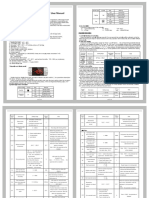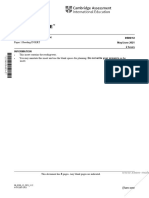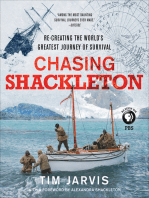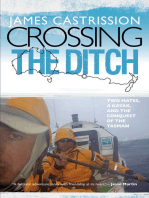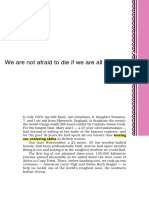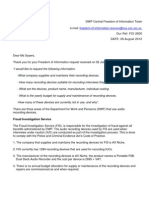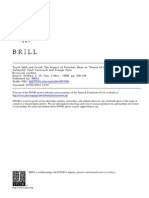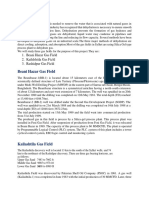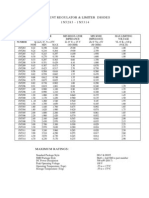0500 s21 in 12 Booklet
0500 s21 in 12 Booklet
Uploaded by
ishraqtazishraqCopyright:
Available Formats
0500 s21 in 12 Booklet
0500 s21 in 12 Booklet
Uploaded by
ishraqtazishraqOriginal Title
Copyright
Available Formats
Share this document
Did you find this document useful?
Is this content inappropriate?
Copyright:
Available Formats
0500 s21 in 12 Booklet
0500 s21 in 12 Booklet
Uploaded by
ishraqtazishraqCopyright:
Available Formats
3
Read Text B, and then answer Question 1(f) on the question paper.
Text B: Crossing Antarctica
This text is an article about Wendy Searle who plans to break the women’s world speed record for
skiing solo to the South Pole, unassisted and unaided – a huge challenge!
Five years ago, Wendy Searle hadn’t considered crossing Antarctica. Then she
organised the media campaign of an expedition to the South Pole by a team of military
personnel. It made her wonder if she could have a go herself.
Despite the fact that she had no previous polar training and had never skied before,
she successfully skied 560 kilometres across the Greenland ice sheet last year: ‘One 5
thing I learned is that my polar expedition will be incredibly tough, mentally.’
Searle will need to ski 1130 kilometres across the frozen continent of Antarctica in less
than 38 days, 23 hours and 5 minutes. ‘I can’t have any outside assistance and I have
to take everything with me in a special sledge called a pulk: all my food, my fuel, my
supplies, everything. I can’t have any food re-supplies or medical help. I cannot even 10
accept a cup of tea,’ she said. ‘I’ll be completely alone and, in all likelihood, I won’t see
anybody else.’
Searle is 1.53 metres tall and weighs just over 60 kilograms; the pulk will weigh over
80 kilograms. Training for the expedition, she needs to spend more than 10 hours a
week lifting weights and running up and down hills pulling a tyre, while also holding 15
down a full-time job. Knowing how difficult and dangerous the route is going to be forces
Searle to prioritise training: ‘That one day you don’t train might be the difference between
success and failure.’
Her family – her husband is a soldier and they have three teenage daughters and a
son – are doing all they can to support her. ‘My children are super-independent. They 20
even organise me. They’ll say, “Don’t forget parents’ evening and these are the
appointments I’ve got you.” They’re amazing.’ She’s determined to inspire them. ‘I want
my children to see that it’s OK to pursue something with a white-hot passion in a
single-minded way and focus on a goal.’
Searle is still raising money to fund the expedition. She feels it’s more difficult to attract 25
sponsorship as a female polar explorer: ‘People need to get behind female adventurers.
I asked a well-known TV agent why there aren’t more programmes about us and she
said, “Honestly, there just isn’t the audience.”’
Searle hopes her story will change perceptions.
© UCLES 2021 06_0500_12_2021_1.12 [Turn over
4 5
Read Text C, and then answer Questions 2(a)–2(d) and Question 3 on the question paper. As winter approached, activities on Base diminished. For entertainment, our dwindling
group played cards or leafed through old magazines.
Text C: Base station, Antarctica
We were given new instructions by Base Commander Simon. We weren’t to walk off
This text is taken from a longer narrative. The narrator is a journalist who has been invited to spend Base without telling him first. The sea ice was hardening at the shore; fresh snowfalls 40
time at a national scientific programme base station on Antarctica. She has travelled by ship with made it difficult to see where land stopped and sea began. We risked falling through.
a new group of staff arriving at the base at the start of summer and is planning to stay long enough
to experience the beginning of winter. Safety was taken seriously – endless rehearsals drilled into us how Antarctic tragedies
had more than one cause; mishaps or misjudgements which sealed people’s fate.
Base emitted a hushed grandeur, as if a vault door had been closed – all noise guarded
fiercely behind it. A gunshot-like crack echoed through the air – an iceberg rotating – Temperatures dropped further. Snowstorms blanketed the runway. The last ship out
then a roar like a distant waterfall as another chunk of the ice shelf collapsed into the depended on the weather. People had overwintered unexpectedly here before. 45
bay. Rough squawks of skuas were magnified through the telescope of empty dry air.
There were no smells of soil, trees, nor grass. Only the scent of Antarctica – like two 5 Around us the world was hardening. In the bay it started as ice flowers, tiny crystal
stones rubbed together. Flint. formations. The creeping carpet of flowers knitted together, until soaked by seawater
it transformed into grey gruel, thickening into porridge. As temperatures plummeted,
We passed truckloads of tinned-food boxes in huge hangars. In summer, Base could porridge-ice welded itself together, and sounded like steel grinding. In gathering darkness
accommodate a hundred people: scientists returning from tented field-camps or being sea ice formed. The continent was closing in on itself, locking itself in. Winter was 50
deployed to them, pilots flying them in and out, cooks, mechanics, even the occasional beginning.
VIP. 10
We were shown the laboratory, air-traffic control tower, stores where ski equipment
was repaired, generator hut and sewage treatment plant. It felt both exciting and daunting
to call this home for the next few months. There were no museums, cafés or restaurants.
No animals, Wi-Fi or children. No real strangers.
That evening we encountered more Base people – young, fit figures without that fume 15
of the outside that still clung to us. They sported the same padded boiler suits and
fleece jackets, and were keen to talk. ‘I don’t call the real world often, it’s best to just
live in the bubble,’ confided marine biologist Ben. I said I planned to stay until the very
last boat out. ‘Winter here’s long,’ he added.
Field training took days; we learned how to abseil into a crevasse, get ourselves out 20
and rescue someone who has fallen in. We hurled ourselves down the sheer face of a
glacier – to learn to break our fall with an ice-axe. We erected and dismantled pyramid
tents, cooked on camp-stoves, and learned how to load a sledge.
There wasn’t much time to think, let alone write, in the early weeks occupied by briefings,
obligatory group activities and trips into the bay to collect water samples. 25
Summer was term time. Each evening scientists gave informal lectures: scientists who
routinely dived beneath the ice among carnivorous leopard seals and orcas; scientists
in the ice-coring team who worked in an underground cavern, surfacing only to cook
and sleep in pyramid tents on the blasted plain of Berkner Island. I was learning more
in weeks than I had in entire years. 30
For the first time I began to think of the planet as an organism whose well-being I could
affect. Here I felt closer to it. I could hear its pulse. ‘In ice, depth equals time,’ explained
Xavier, a scientist working with the ice-coring team. ‘The further down you go, the further
back in time you go. The ice core shows that major changes have taken place within
Earth’s climate. There’s an irrefutable steady upward trend, directly linked to carbon 35
dioxide, and humans.’ I shivered involuntarily.
© UCLES 2021 06_0500_12_2021_1.12 © UCLES 2021 06_0500_12_2021_1.12
You might also like
- Gray and White Simple Clean ResumeDocument2 pagesGray and White Simple Clean Resumeprashikkamble536100% (1)
- Ek 3030Document4 pagesEk 3030NdaoNo ratings yet
- The Greatest Polar Expedition of All Time: The Arctic Mission to the Epicenter of Climate ChangeFrom EverandThe Greatest Polar Expedition of All Time: The Arctic Mission to the Epicenter of Climate ChangeNo ratings yet
- Cambridge IGCSE: 0500/12 First Language EnglishDocument8 pagesCambridge IGCSE: 0500/12 First Language EnglishGaurav ChaudhuriNo ratings yet
- The Whale and the Supercomputer: On the Northern Front of Climate ChangeFrom EverandThe Whale and the Supercomputer: On the Northern Front of Climate ChangeRating: 4 out of 5 stars4/5 (7)
- Geese Commercial FarmingDocument24 pagesGeese Commercial FarmingALTAF HUSAIN100% (2)
- 0500 s21 in 12Document3 pages0500 s21 in 12ishraqtazishraqNo ratings yet
- EFL (June)Document10 pagesEFL (June)StuartNo ratings yet
- ChromeDocument4 pagesChromeDr.Eman MostafaNo ratings yet
- Antartica - Passage CDocument2 pagesAntartica - Passage CJenNo ratings yet
- Paper 1Document41 pagesPaper 1maryam yahyaiNo ratings yet
- Cambridge IGCSE: First Language English 0500/12Document24 pagesCambridge IGCSE: First Language English 0500/12cvandu10No ratings yet
- South Polar Times MagazineDocument11 pagesSouth Polar Times MagazineomaedehNo ratings yet
- Beyond the Edge: Accounts of Historic, Significant, and Little-Known Expeditions on the Greenland Ice Cap: Beyond the Edge, #2From EverandBeyond the Edge: Accounts of Historic, Significant, and Little-Known Expeditions on the Greenland Ice Cap: Beyond the Edge, #2No ratings yet
- My Arctic journal: a year among ice-fields and EskimosFrom EverandMy Arctic journal: a year among ice-fields and EskimosNo ratings yet
- Macquarie Island - CAE Gapped Text (Reading)Document2 pagesMacquarie Island - CAE Gapped Text (Reading)anestesistaNo ratings yet
- Arctic Safari 2012 Adventure LogDocument42 pagesArctic Safari 2012 Adventure LogadventurecanadaNo ratings yet
- Chasing Shackleton: Re-creating the World's Greatest Journey of SurvivalFrom EverandChasing Shackleton: Re-creating the World's Greatest Journey of SurvivalNo ratings yet
- PDF of Close Contact Terperangkap Lori Foster Full Chapter EbookDocument69 pagesPDF of Close Contact Terperangkap Lori Foster Full Chapter Ebookjannedwarm276100% (11)
- Lost Beneath the Ice: The Story of HMS InvestigatorFrom EverandLost Beneath the Ice: The Story of HMS InvestigatorRating: 4 out of 5 stars4/5 (7)
- Luxury On Ice Article IxlosDocument9 pagesLuxury On Ice Article IxlosAzimov ShoxruxNo ratings yet
- Addicted to Adventure: Between Rocks and Cold PlacesFrom EverandAddicted to Adventure: Between Rocks and Cold PlacesRating: 5 out of 5 stars5/5 (1)
- Iced In: Ten Days Trapped on the Edge of AntarcticaFrom EverandIced In: Ten Days Trapped on the Edge of AntarcticaRating: 4.5 out of 5 stars4.5/5 (11)
- Antarctica LogsDocument15 pagesAntarctica LogsANo ratings yet
- 138-0 Covert One 7 - The Arctic Event - Ludlum - RobertDocument109 pages138-0 Covert One 7 - The Arctic Event - Ludlum - RobertShubhra TalukdarNo ratings yet
- Terraforming: The Creating of Habitable WorldsFrom EverandTerraforming: The Creating of Habitable WorldsRating: 4.5 out of 5 stars4.5/5 (5)
- 014 Antarctica, The Last Frontier - v2Document5 pages014 Antarctica, The Last Frontier - v2Lara IonescuNo ratings yet
- After the Ice: Life, Death, and Geopolitics in the New ArcticFrom EverandAfter the Ice: Life, Death, and Geopolitics in the New ArcticNo ratings yet
- Adrift in The Ice-Fields by Hall, Charles W.Document142 pagesAdrift in The Ice-Fields by Hall, Charles W.Gutenberg.orgNo ratings yet
- Fraser's Penguins: A Journey to the Future in AntarcticaFrom EverandFraser's Penguins: A Journey to the Future in AntarcticaRating: 4 out of 5 stars4/5 (4)
- Shackleton in the Antarctic: Being the story of the British Antarctic expedition, 1907-1909From EverandShackleton in the Antarctic: Being the story of the British Antarctic expedition, 1907-1909No ratings yet
- 2009 Adventure Canada High Arctic LogDocument15 pages2009 Adventure Canada High Arctic LogadventurecanadaNo ratings yet
- Download Complete Sensation and Perception 10th Edition, (Ebook PDF) PDF for All ChaptersDocument55 pagesDownload Complete Sensation and Perception 10th Edition, (Ebook PDF) PDF for All Chaptersstallgeani100% (8)
- Download ebooks file 4000 Essential English Words Book 3 2nd Edition Paul Nation all chaptersDocument55 pagesDownload ebooks file 4000 Essential English Words Book 3 2nd Edition Paul Nation all chaptersmlleeqohumuNo ratings yet
- Rowing the Northwest Passage: Adventure, Fear, and Awe in a Rising SeaFrom EverandRowing the Northwest Passage: Adventure, Fear, and Awe in a Rising SeaRating: 4 out of 5 stars4/5 (6)
- Download ebooks file Cold Latitudes 1st Edition Rosemary Mcguire all chaptersDocument40 pagesDownload ebooks file Cold Latitudes 1st Edition Rosemary Mcguire all chapterschalawedelfq100% (4)
- 2019 Staar gr8 Reading TestDocument40 pages2019 Staar gr8 Reading Testsomkumar1No ratings yet
- Cold: Extreme Adventures at the Lowest Temperatures on EarthFrom EverandCold: Extreme Adventures at the Lowest Temperatures on EarthRating: 4 out of 5 stars4/5 (13)
- We Are Not Afraid To DieDocument9 pagesWe Are Not Afraid To DieOjas BajajNo ratings yet
- Trial of Strength: Adventures and Misadventures on the Wild and Remote Subantarctic IslandsFrom EverandTrial of Strength: Adventures and Misadventures on the Wild and Remote Subantarctic IslandsNo ratings yet
- ΘΕΜΑΤΑ ΑΓΓΛΙΚΩΝ Α ΛΥΚΕΙΟΥ - ΙΟΥΝΙΟΣ 14Document3 pagesΘΕΜΑΤΑ ΑΓΓΛΙΚΩΝ Α ΛΥΚΕΙΟΥ - ΙΟΥΝΙΟΣ 14gxartNo ratings yet
- Space PhysicsDocument32 pagesSpace PhysicsishraqtazishraqNo ratings yet
- How Do Catalysts WorkDocument2 pagesHow Do Catalysts WorkishraqtazishraqNo ratings yet
- Moles QPDocument10 pagesMoles QPishraqtazishraqNo ratings yet
- 99 NamesDocument3 pages99 Namesishraqtazishraq100% (1)
- IGCSE 2024 May-June TimetableDocument2 pagesIGCSE 2024 May-June Timetableishraqtazishraq100% (3)
- FOI Fraud Investigation Service (DWP) 1284 MachinesDocument3 pagesFOI Fraud Investigation Service (DWP) 1284 MachinesPaul SmithNo ratings yet
- Electrical Non-Metallic ConduitDocument40 pagesElectrical Non-Metallic ConduitKen ServillaNo ratings yet
- Final Exam in Tax 2Document5 pagesFinal Exam in Tax 2elminvaldezNo ratings yet
- Allison Transmission Oil Change IntervalDocument28 pagesAllison Transmission Oil Change IntervalJeremy Martin0% (1)
- Bio RestrainingDocument26 pagesBio RestrainingMarko BregovecNo ratings yet
- Early 18x Documentation ReleaseDocument15 pagesEarly 18x Documentation ReleaseDr. Ronald R. Stiffler100% (2)
- Volcano NotesDocument2 pagesVolcano NotesLoy Yoke YueNo ratings yet
- Employee Well Being As A Mediator of Cor PDFDocument17 pagesEmployee Well Being As A Mediator of Cor PDFdewita andromedaNo ratings yet
- Tayeb Salih and FreuffffDocument23 pagesTayeb Salih and FreuffffbascutaNo ratings yet
- Myers Paperrevision 11282017Document20 pagesMyers Paperrevision 11282017api-372118600No ratings yet
- Dehydration System in SGFLDocument5 pagesDehydration System in SGFLShaniz KarimNo ratings yet
- Linde FTO InfoDocument12 pagesLinde FTO Info88blueNo ratings yet
- KFC CaseDocument14 pagesKFC Caseapi-3855203100% (1)
- 3ºESO WayToEng3 EXTRAPRACTICE UNIT5Document4 pages3ºESO WayToEng3 EXTRAPRACTICE UNIT5isabelNo ratings yet
- First-Aid Kits For Circuit Boards, Time-Tested and Guaranteed. Multiple Product Instruction ManualDocument87 pagesFirst-Aid Kits For Circuit Boards, Time-Tested and Guaranteed. Multiple Product Instruction Manualh_878236333No ratings yet
- Drug IncompatibilityDocument16 pagesDrug Incompatibilityant beeNo ratings yet
- Voltage Drop Calculation Based On National Electrical CodeDocument4 pagesVoltage Drop Calculation Based On National Electrical CodeNeil Carl InoNo ratings yet
- CALIFORNIA ED CODE Eligibility CriteriaDocument6 pagesCALIFORNIA ED CODE Eligibility Criteriasubscribed14No ratings yet
- Screenshot 2024-02-17 at 8.14.49 PMDocument5 pagesScreenshot 2024-02-17 at 8.14.49 PMyengnet24No ratings yet
- Donations, Gifts and Sponsorships Model PolicyDocument5 pagesDonations, Gifts and Sponsorships Model Policyarchess pizonNo ratings yet
- LOH Ideal Gas LawDocument35 pagesLOH Ideal Gas LawChristine PiedadNo ratings yet
- Empathic ListeningDocument7 pagesEmpathic ListeningElaina JoyNo ratings yet
- Current Regulator & Limiter Diodes 1N5283 - 1N5314Document1 pageCurrent Regulator & Limiter Diodes 1N5283 - 1N5314UruzTeamNo ratings yet
- Top ProducerDocument9 pagesTop ProducerRamil Jr. EntanaNo ratings yet
- S. L. Blair, P. N. Claster, S. M. Claster Eds. Technology and Youth Growing Up in A Digital WorldDocument491 pagesS. L. Blair, P. N. Claster, S. M. Claster Eds. Technology and Youth Growing Up in A Digital WorldDaniela CracanNo ratings yet
- Jedec Standard: Arrowhead QADocument32 pagesJedec Standard: Arrowhead QAdaveNo ratings yet
- AS Chemistry CIE: 1.8 Reaction KineticsDocument21 pagesAS Chemistry CIE: 1.8 Reaction Kineticskaikhasraw09No ratings yet


